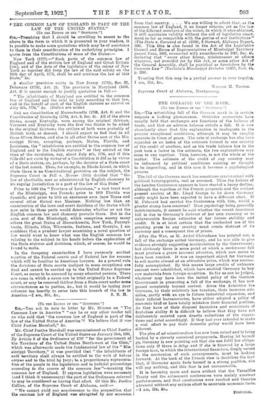V THE COMMON LAW OF ENGLAND IS PART OF THE
LAW OF THE UNITED STATES."
[To THY EDITOR OF THE " SPECTATOR."] Stn,—Premising that I should be unwilling to assent to the above in the form in which it is presented to your readers, it is possible to make some quotations which may be of assistance to them in their consideration of its underlying principles. I quote from the Constitutions of some of the States:— New York (1777).—" Such parts of the common law of England and of the statute law of England and Great Britain [sic], and of the Acts of the legislature of the colony of New York as together did form the law of the said colony on the 19th day of April, 1775, shall be and continue the law of this State," &o.
A similar provision exists in New Jersey (1776), Sec. 22, Delaware (1776), Art. 25. The provision in Maryland (1850, Art. 3) is quaint enough to justify quotation in full :— " The inhabitants of Maryland are entitled to the common law of England and the trial by jury according to that law, and to the benefit of such of the English statutes as existed on July 4th, 1776," &c. (Italics are mine.) And see Constitution of Massachusetts (1780, Art. 6) and the Constitution of Kentucky (1792, Art. 8, Sec. 6). All of the above States, except Kentucky, were among the original thirteen. Vermont and Kentucky were the first two States to be added to the original thirteen; the settlers of both were probably of British birth or descent. I should expect to find that in all these fifteen States, and also in all other States east of the Mis- sissippi River, excepting, perhaps, Maine, Florida, and Louisiana, the " inhabitants are entitled to the common law of England and to the English statutes " as they existed at the time of the revolution, say, about July 4th, 1776, and if this title did not exist by virtue•of a Constitution it did so by virtue of a State statute, or, perhaps, by the decision of a State court of the last resort. Thus, for example, in Rhode Island, in which State there is no Constitutional provision on the subject, the Supreme Court in Pell v. Mercer (1883) decided that "the law of charitable uses as administered by English, chancery in its reguler jurisdiction is a part of the law of this State."
Prior to 1803 the "Province of Louisiana," a vast tract west of the Mississippi, was French; prior to 1819 Florida was Spanish; and prior to 1849 an enormous area (now Texas and several other States) was Mexican. Nothing less than an examination of the laws and court decisions of the States which now exist in these parts would determine whether or not the English common law and chancery prevails there. But in the area east of the Mississippi, which comprises among many others the great States of Massachusetts, New York, Pennsyl- vania, Illinois, Ohio, Wisconsin, Indiana, and Georgia, I am confident that a prudent lawyer examining a novel question of Jaw would want to know what was the English common law relating to the subject in his hands before the exploration of the State statutes and decisions, which, of course, he would be found to make.
In the foregoing examination I have purposely omitted mention of the Federal courts and of Federal law for reasons which will be familiar to American lawyers. As a general rule the decisions of State courts (subject to some exceptions) are final and cannot be carried up to the United States Supreme Court, as seems to be assumed by many educated persons. There are cases in which a cause can be tried originally in a Federal court, or may be removed thither from a State court under some circumstances as to parties, &c., but it would be taxing your columns too heavily to enter into this branch of the law in


































 Previous page
Previous page